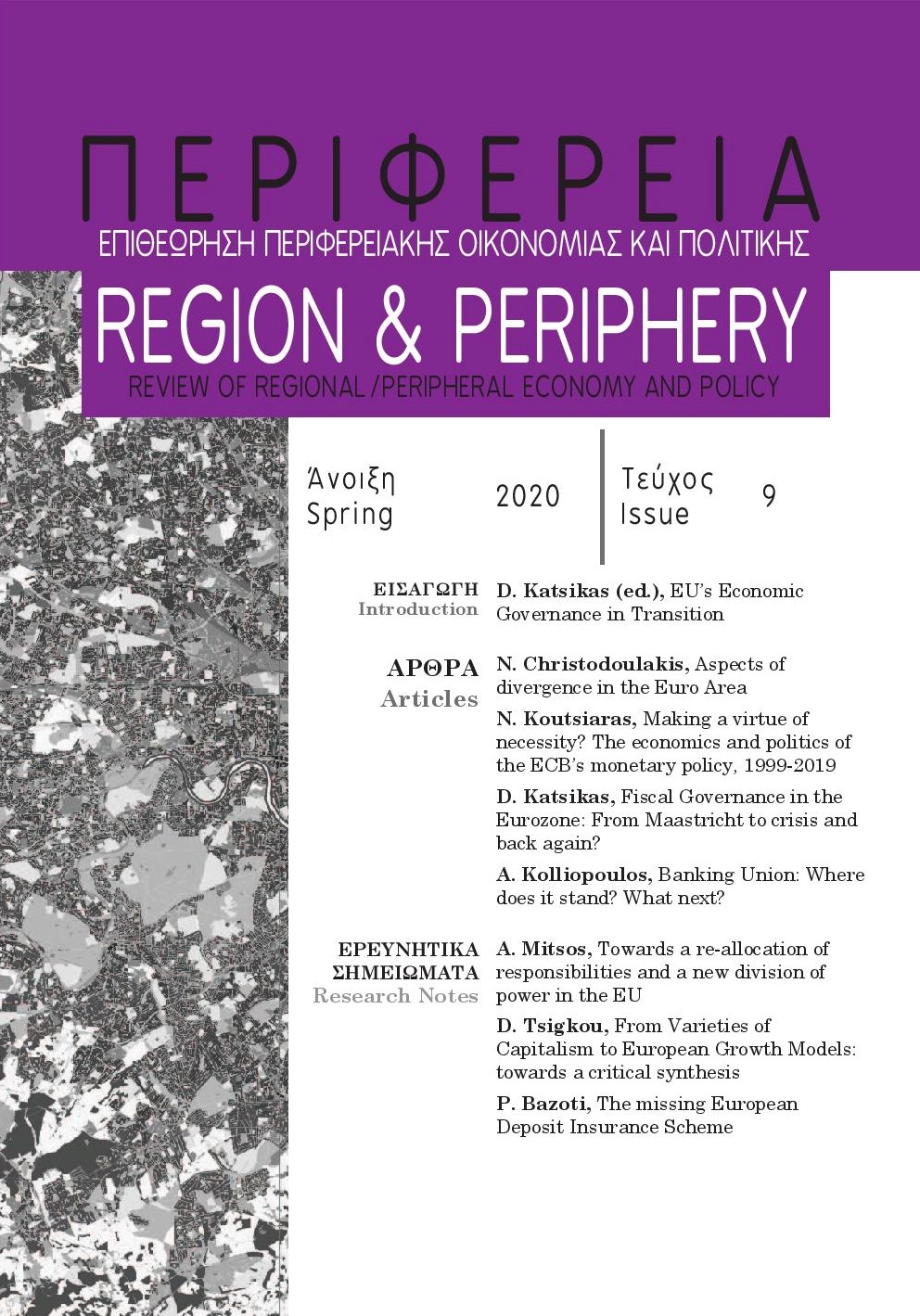Από τα Μοντέλα Καπιταλισμού στα Ευρωπαϊκά Μοντέλα Ανάπτυξης: Προς μια κριτική σύνθεση
Περίληψη
Η ευρέως διαδεδομένη πεποίθηση ότι η παγκοσμιοποίηση θα οδηγούσε στη σταδιακή σύγκλιση των ανεπτυγμένων καπιταλιστικών οικονομιών αμφισβητήθηκε με την ανάδειξη της βιβλιογραφίας του Συγκριτικού Καπιταλισμού. Αναμφίβολα, η θεωρία των Μοντέλων Καπιταλισμού αποτελεί την πιο σημαντική προσέγγιση στο πλαίσιο του Συγκριτικού Καπιταλισμού. Σύμφωνα με την εν λόγω Θεωρία, οι όποιες διαφορές παρατηρούνται μεταξύ των προηγμένων καπιταλιστικών οικονομιών, όχι μόνο δεν απαλείφονται, αλλά, αντιθέτως, ενδέχεται να ενισχυθούν ως αποτέλεσμα των διαφορετικών συγκριτικών θεσμικών πλεονεκτημάτων που διατηρούν τα εκάστοτε κοινωνικοοικονομικά μοντέλα. Ωστόσο, σε αυτήν τη βάση, σύντομα αναδύθηκε μία δεύτερη γενιά Συγκριτικού Καπιταλισμού, η οποία επέκρινε τη Θεωρία των Μοντέλων Καπιταλισμού -μεταξύ άλλων- για το δυαδικό οντολογικό της πλαίσιο, καθώς και για τις διάφορες εμπειρικές της ελλείψεις. Κατά την παρούσα χρονική περίοδο, έχει αναπτυχθεί μία τρίτη γενιά Συγκριτικού Καπιταλισμού, η οποία διαφοροποιείται ριζικά από τη θεωρία των Μοντέλων Καπιταλισμού, επικεντρώνοντας τις αναλύσεις της στην πλευρά της ζήτησης αντί της προσφοράς. Το παρόν άρθρο υποστηρίζει ότι, ενώ η τρίτη γενιά Συγκριτικού Καπιταλισμού έχει μετατοπίσει την προσοχή της σε άλλους θεσμικούς τομείς και πεδία πολιτικής, δίνοντας έμφαση κυρίως σε μακροοικονομικά ζητήματα, ιδίως σε ό,τι αφορά τη μεταρρύθμιση της οικονομικής πολιτικής, ένας επιστημολογικός συγκερασμός μεταξύ των δύο κυρίαρχων προσεγγίσεων του Συγκριτικού Καπιταλισμού θα μπορούσε να συμβάλλει στην καλύτερη κατανόηση των διαφορετικών προτάσεων που προωθούν τα κράτη-μέλη αναφορικά με την επικείμενη μεταρρύθμιση της Ευρωζώνης.
Λεπτομέρειες άρθρου
- Πώς να δημιουργήσετε Αναφορές
-
Τσίγκου Δ. (2020). Από τα Μοντέλα Καπιταλισμού στα Ευρωπαϊκά Μοντέλα Ανάπτυξης: Προς μια κριτική σύνθεση. Περιφέρεια | Regional Integration: Politics, Economics, Governance, (9), 141–149. https://doi.org/10.12681/rp.23788
- Ενότητα
- Ερευνητικό Σημείωμα

Αυτή η εργασία είναι αδειοδοτημένη υπό το CC Αναφορά Δημιουργού – Μη Εμπορική Χρήση 4.0.
Οι συγγραφείς των άρθρων που δημοσιεύονται στο περιοδικό διατηρούν τα δικαιώματα πνευματικής ιδιοκτησίας επί των άρθρων τους, δίνοντας στο περιοδικό το δικαίωμα της πρώτης δημοσίευσης.
Άρθρα που δημοσιεύονται στο περιοδικό διατίθενται με άδεια Creative Commons 4.0 Non Commercial και σύμφωνα με την άδεια μπορούν να χρησιμοποιούνται ελεύθερα, με αναφορά στο/στη συγγραφέα και στην πρώτη δημοσίευση για μη κερδοσκοπικούς σκοπούς.
Οι συγγραφείς μπορούν να καταθέσουν το άρθρο σε ιδρυματικό ή άλλο αποθετήριο ή/και να το δημοσιεύσουν σε άλλη έκδοση, με υποχρεωτική την αναφορά πρώτης δημοσίευσης στο περιοδικό Περιφέρεια.
Οι συγγραφείς ενθαρρύνονται να καταθέσουν σε αποθετήριο ή να δημοσιεύσουν την εργασία τους στο διαδίκτυο πριν ή κατά τη διαδικασία υποβολής και αξιολόγησής της.



